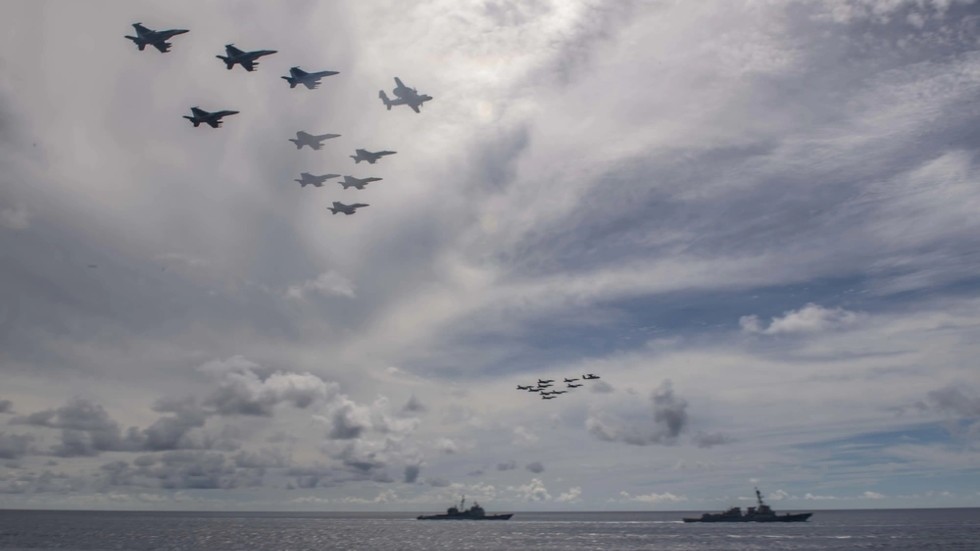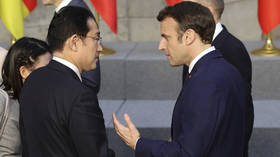
Beijing vows a “resolute response” should the US-led military bloc attempt to move closer to its borders

FILE PHOTO: US military aircraft and warships are seen in formation during a transit of the South China Sea by the Nimitz Carrier Strike Force, July 6, 2020. © US Navy / MC 3rd Class Cody Beam
The Chinese government has urged NATO not to expand into the Asia-Pacific, warning that it would retaliate to any increased Western military presence in the region after the alliance criticized Beijing during its summit in Lithuania.
China’s Mission to the European Union issued a statement on Tuesday in response to NATO’s joint communique, which accused Beijing of pursuing “coercive policies” that “challenge” Western interests.
“The China-related content of the communique disregards basic facts, wantonly distorts China’s position and policies, and deliberately discredits China. We firmly oppose and reject this,” the Chinese diplomats said.
The statement went on to pledge that Beijing would “safeguard its sovereignty” and oppose “NATO’s eastward expansion into the Asia-Pacific.” It added that “any actions that damage China’s legitimate rights and interests will be met with a resolute response.”

Leaders of the Western military alliance met on Tuesday in the Lithuanian capital, Vilnius, to discuss additional aid to Ukraine, among other matters. They also accused Beijing of posing “cyber, space, hybrid and other asymmetric threats,” and of engaging in “the malicious use of emerging and disruptive technologies.”
The Chinese EU mission argued that NATO had failed to reflect on its own responsibilities, and instead “blindly blames other countries, keeps meddling in extraterritorial affairs [and] creates confrontation.” It added that the bloc’s “ambitions for expansion and hegemony are obvious,” and warned that its status as a “nuclear alliance” would only “further aggravate regional tensions.”
The statement comes after Chinese officials warned against the opening of a NATO liaison office in Japan, which would mark the bloc’s first facility in Asia. Though Tokyo indicated it was considering the idea, France has reportedly shot down the project, insisting NATO should remain confined to the North Atlantic.
The relations between the US and China have deteriorated significantly in recent years, with countries clashing over Taiwan, global trade, and human rights.
Beijing’s remarks on NATO’s expansion echo previous criticisms from Moscow, which has repeatedly decried the alliance’s gradual expansion eastward in recent decades, and stressed that it considers Western military sites close to its borders a threat to national security. NATO has rejected these claims, insisting that the supply of heavy weapons to Ukraine does not make the alliance a party to the Russia-Ukraine conflict.
Kiev had hoped it would be offered a clear path to NATO membership at the Vilnius summit on Tuesday, but was disappointed after the alliance reiterated its prior promises to admit Ukraine as a member at some point in the future, after its armed conflict with Russia is resolved.




